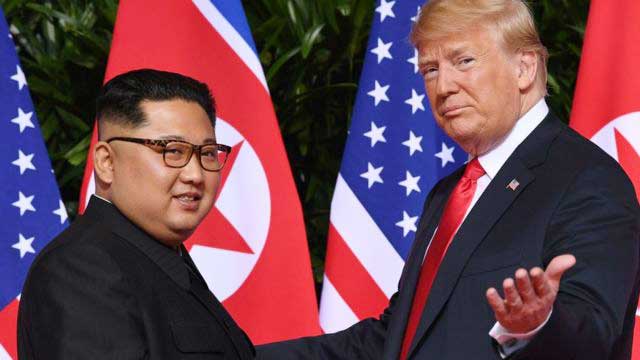US President Donald Trump is to meet North Korean leader Kim Jong-un for a second summit by the end of February, the White House says.
The announcement came after Mr Trump met top North Korean negotiator Kim Yong-chol at the White House.
He had been expected to deliver a letter from Kim Jong-un to Mr Trump.
Little progress has been made on denuclearisation since their historic summit in Singapore last June. No venue has been announced for the new summit.
Speculation is mounting that it could be held in Vietnam.
Kim Yong-chol's visit to Washington is the first sign of movement in nuclear diplomacy with North Korea for months, BBC state department correspondent Barbara Plett Usher reports.
It is not clear what the reported letter from Kim Jong-un contained. But it was expected to lay the groundwork for another summit, our correspondent adds.
President Trump said he was looking forward to the talks.
His press secretary Sarah Sanders said after the White House meeting that progress in the talks on denuclearisation continued, but added: "The United States is going to continue to keep pressure and sanctions on North Korea."
What has happened since the last summit?
Not very much was agreed on in the Singapore summit, so there is little to measure success by.
Nuclear negotiations between Washington and Pyongyang have stalled, no detailed account of North Korea's nuclear facilities has been provided and sanctions are still firmly in place.
Mr Kim however, has been busy boosting his global image. He's improved relations with neighbouring South Korea, and both countries have destroyed guard posts along the heavily guarded demilitarised zone - and paid trips to each other's countries.
Ties between North Korea and China also appear to have improved, with Mr Kim making multiple trips to Beijing to meet President Xi.
What was achieved at the Singapore summit?
The summit was historic for the fact that it happened at all - but on paper, all it really achieved was a vaguely-phrased agreement in which both countries agreed to work towards denuclearisation.
It was never really made clear what denuclearisation would entail - the agreement did not include any timeline, details or mechanisms to verify this process.-BBC
YS





